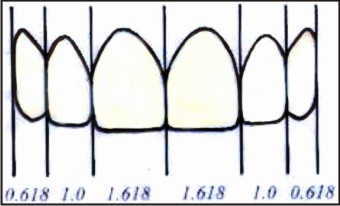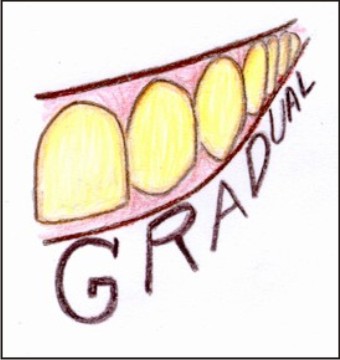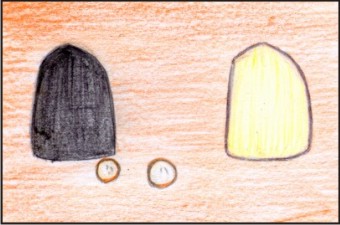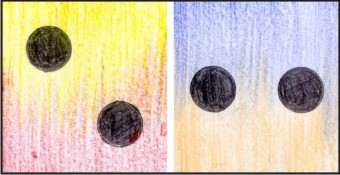Introduction
It was once written that we greet the world with our faces. Facial appearance is of great concern to every one for it is a significant part of the self image. Enhancement of facial beauty is the one of the primary elective goals of the patients seeking dental care. The prosthesis can either enhance or detract from the patient’s personal image, depending upon the naturalness and attractiveness of its appearance. As the definition goes denture esthetics is the effect produced by a dental prosthesis that affects the beauty and attractiveness of the person.
The perceptual principles can free the dentists from the confusion existing in the field of denture esthetics and enable them to confidently approach the task of enhancing the patient’s appearance. Principles may be applied to all and they eliminate the personal attributes of talent and the need of specific formulae for achieving an esthetic result.
The field of denture esthetics is of critical importance to the well being of the patients and one of dentistry’s greatest challenges is to completely eliminate the delivery of static, poorly planned clumsily executed dentures. This challenge is each individual dentist’s responsibility and cannot be subcontracted. Frush & Fisher have best stated the objectives that must be achieved in denture esthetics as Dentogenic Concept commonly known as SPA factor, where patients sex, personality and age are interpretated by creating deture esthetics accordingly.[1],[2],[3] The patient is restored to his true quality of a living and breathing man or woman with an individual personality and either the dignity of his years or freshness of his youth”.
Review Of Literature
WHITE (1872): - proposed the concept of “Correspondence and Harmony". Here the temperament called for a characteristics association of tooth form and color', while harmony called for a corresponding proportion and size of tooth to that of the face, and a tooth color in harmony with facial complexion; that both form and color were modified to be in harmony with sex and age. Perhaps this was the first dental concept and technique relating to the temperamental theory, also relating to esthetic fundamentals.
HALL (1887):- proposed the typal form concept. He listed three classifications using terms such as (1) Ovoid, (2) Tapering and (3) Square. It is of interest to note that a typal form theory was projected at least a quarter century before that of William.
WILLIAMS (1914):- suggested “Williams Typal form Method.” According to him a geometric pattern was created by the outline form of the skeletal face form, as square, tapering and ovoid forms.
FRUSH AND FISHER 1,2,3(1956-1957):-suggested the dynesthetics concept and demonstrated the consideration of age , sex and personality in achieving esthetics.
MEYER M. SILVERMAN [4](1956):- proposed a phonetic method for determinations of the patient’s natural vertical dimension. He concluded that measurement of closet speaking space was faster and more accurate than measuring the free way space and this procedure helped to avoid the establishment of an inaccurate vertical dimension.
H.A.YOUNG[5] (1956):-Described physical facial values (size, profile, outline and proportions of face, lip, nostrils vertical dimensions etc.) and orodental values(tooth and denture base characteristics) to create esthetic.
RALPH H. BOSS [6] (1956):-Described a physiologic technique for denture construction. He suggested conditioning of the tissues and musculature, following principles of non displacement, functional denture borders, and inclusion of tissue details.
THOMAS E.J. SHANHAN[7] (1956):- described a physiological method to determine the natural vertical dimension and the centric relation at this natural vertical dimension. The physiologic vertical dimension was determined by constantly repeated function of swallowing saliva.
DAYTON DUNBAR KRAJICEK[8] (1962):- emphasized on the use of accurate impressions, vertical dimension, natural contouring of the denture base, placing the anterior teeth in their natural position, and avoiding typical small white and even teeth. He also stressed upon arrangement of teeth in accordance with age and reshaping the teeth before positioning.
RICHARD E. LOMBARDI[9] (1973):-Discussed the principles of visual perception and their application to denture esthetics. These principles included composition, proportion in denture esthetics (Golden proportion), preplanned esthetics by analyzing the shape of mouth, balance in esthetics, line in denture esthetic including the selection of mold and arrangement of teeth and colour in denture esthetics.
CARL 0. BOUCHER[10] (1975):- emphasized on the opportunity to develop better esthetics because of the availability of better teeth and denture base materials. He highlighted on the use of neutral zone concept for the placement of denture teeth and also harmonizing the teeth with face of the patient.
EARL POUND[11] (1977):-suggested pronunciation of letter “s” to establish the vertical dimension of occlusion. There is 1 to 1.5 mm of clearance between incisal edges of lower central incisors and coronal surface of upper central incisors.
M. ROBERT MACK[12] (1991): -he explained that the facial height is neither static nor limited by clinical resting length of masticatory muscles. He concluded that differences between EMG rest (5 to 12mm beyond VDO) and clinical rest (1 to 3mm beyond VDO) confirm the adaptability of facial mask to sensitive changes in VDO.
DANIEL H. WARD[13] (2001):- has proposed a RED proportion or Reoccurring Esthetic Dental Proportion. According to this, 70% seems to be more pleasing but should be modified to fit face skeletal structure and general body type. Secondly width to height ratio for central incisor should be kept as 66%- 80%.
JEFF MORLEY et al[14] (2001):- categorized macroesthetic criteria for smile design based on 2 reference points- the facial midline and the amount & the position of tooth reveal.
LEILA JAHANGIRI et al[15] (2002):- studied the possibility of relationship between tooth shade and skin color they concluded that older persons were more likely to have teeth with lower values (darker). Secondly the tooth shade value and skin color were inversely related.
Denture Estheics Concept
Denture esthetics is not merely selection of prosthetic teeth. It starts right from the impression making procedure, the thickness and extension of impression borders that will finally from the denture flanges to give lip support, later the restoration of vertical dimension and the occlusal plane, these all contributes to the successful implication of denture esthetics concepts. The historical literature presented in this review demonstrates that the majority of esthetic guidelines used in complete denture fabrication are based on the suggestions of clinicians.
Esthetics goes much further than simple placement of teeth in occlusal rims. The dentists must consider both the anatomy and physiology of face as well as artistic principles to achieve a natural looking denture. Esthetics may not mean exactly the same to all, yet all would agree that beauty, harmony and natural appearance are the fundamental esthetics requirements. Denture esthetics can be discussed under following headings for ease of understanding
Principles of visual perception and their clinical application to denture esthetics
Considerations in denture esthetics
Dentogenic concept in denture esthetics
Selection of anterior teeth
Arrangement of teeth for esthetics
Esthetics and denture base
1. Principles Of Visual Perception And Their Clinical Application To Denture Esthetics
The process of perception is an organization of sensory data, which are brought to intellect where an answer is developed in combination with the results of previous experience or beliefs that are unconsciously interpreted. This is known as percept. Principles of visual perception consists of: composition, proportion in denture esthetics, preplanned esthetics, and balance, line and color in denture esthetics.
a) Composition:
The study of the relationships existing between objects made visible by contrast in color line and texture is called composition as contrasts decreases visibility decreases. Unity is the prime requisite of composition meaning “oneness”. It exists in two types, Static (regular shapes like snowflakes or crystals) and Dynamic (plants and animals).
Cohesive forces are the element that tends to unite a composition. Segregative forces are opposite of cohesive. Unity with variety is necessary to make the design effective. Dominance is prime requisite to provide unity. One color, shape line must dominate and others must be subservient. Dominance of dental composition may be increases by making it more visible by increasing mould size, using lighter teeth, increasing the exposed gingivo-incisal length.
b) Proportion in denture esthetics:
In discussing the size of the teeth it is always necessary to consider the element of proportion. This is accomplished by the use of a continued proportion of repeated ratio i.e. the golden proportion of 1.618 (Fig.1) The ratio between the width of central and lateral incisor should be established and this ratio should be continued in placement of remaining teeth and spaces. The first bicuspids are the key tooth in maintaining the repeated ratio. It should meet all the requirements of anterior teeth and considered as the 7th & 8th anterior. The front to back progression is a critical factor because the illusion of arch shape and depth must be provided in composition two like structures place at a distance from each other (Fig.2). The closer one will appear larger. The buccal corridor helps achieve these requirements by altering the light. Two objects of same size the lighter one will appear larger; (Fig. 3) this is the principle of illumination.
 | Fig. 1. Anterior Six Teeth In Golden Proportion
 |
 | Fig. 2. Diminution In Size & Detail Must Occur Gradually
 |
 | Fig. 3 Same Size – But Lighter Appears Larger
 |
c) Preplanned Esthetics:
Bearing in mind the evaluation of the patient as a being, an analysis should be made of the shape of the mouth. Important features to be considered are width and height, location of commissure in smiling position.
An esthetic upper denture should have following composition: 1. All anterior teeth must not be of similar widths. 2. Dominance must be exhibited by using a central incisor of sufficient size to dominate the composition. 3. Teeth must not be set on the static curve of a circle but on a dynamic line similar to Hogarth’s line, and teeth must be set with regard to a repeated ratio to provide unity with variety 4.Size with the patient’s age, sex and personality to provide subjective unity.
d) Balance in denture esthetics:
One cannot see anything without also seeing the immediate surroundings at the same time. There is always a relative interpretation. Taking an example of disk on the corner of square exhibits a phenomenon of induced forces (Fig. 4). Placing another disk at another corner relives the tension of unstable position which should be centre of square (Fig. 5). The force field of the disk is affected by the structural feature of the surface upon which the disk is moved.
 | Fig. 4 Unstable Stable
 |
 | Fig. 5 Stable
 |
A proposed structural map of the force fields of the tooth area of mouth is illustrated. The proper midline location is necessary for stability. It may be judged that the attractive qualities of the “smiling line” may derive from the stability gained by the lines approximation to the diagonals 'of the structural map.
The induced force principle answers the whether the midline should be placed in the mid head or the mouth. It should be placed at a point where it should be stable and does not seem to move midline.
e) Line in denture esthetics:
The management of the factor of line is an important element in the arrangement of an esthetic denture. Line is involved in the shape of the tooth, the relationships between adjacent teeth, between the teeth and the matrix, between the teeth and the background, and between the teeth and dark area between upper and lower teeth. Line is also involved in the line formed by the incisal edges and the buccal cusp tips of the teeth , in occlusal plane. The shape of individual tooth is unimportant because of the 2 other perception principles:
The primacy of the whole- the shape of an element becomes secondary to the shape of a series of the elements. The parts become a new whole.
Presence of a border- which binds the elements within, into a separate organized entity. If we consider a painting on a wall the frame confines the attention of the eye to the contents within the frame. In dentistry the wall (face) and frame (lips) are provided by nature and attention is confined to the contents within the lips. The dark space between the jaw known as the negative space contributes to the individualization of dental composition that is projected by color contrast.
f) Color in denture esthetics:
To perceive a color three basic components i.e. Hue, Value and Chroma are considered. Hue is not of critical importance in dentistry since variation of hue in dental shades are too low to be appreciated. The matching of porcelain jacket crowns to natural teeth, a missing tooth to denture or a denture to a face is one selecting the proper value and not proper color. Successful shade selection depends on selection of correct lightness and darkness.
The important factors that affect the selection of shade are personality, background, facial features, total tooth area displayed and the amount of light reaching the teeth.
The personality factor may be broken down to strong, average, and soft. A strong personality indicates the need of strong teeth arrangement; therefore an indicator of lighter shade. Darker shade people will not require light shade because the dark background will make the shade appear lighter anyhow. Facial features like large, intense eyes, large nose and dark hair all are strong features.
Light is the amount of illumination reaching the teeth and is affected by the height of the lip line as well as thickness or fullness of lips. The mouth with a reduced amount of illumination on the teeth strongly demands for lightness of shade. This factor may be described as being dark, average or light.
2. Considerations In Denture Esthetics
The subject of esthetics should be examined from three points of view
a) Biological-physiological considerations:
Dentures determine the appearance of lower one third of face in edentulous patients the teeth and their supporting bases are responsible for maintaining a pleasing and normal facial expression for they hold the lips and facial musculature in proper physiological position. To achieve proper physiological length and tone rnusculature special attention must be given to:
1. Impressions & thickness of labial borders
2. Visual concept of cause & effect relationship
3. Vertical jaw relations.
b) Biomechanical considerations:
There are certain mechanical limitations in the placement of anterior teeth that must be taken into account. A general rule place the anterior teeth should be placed as closely in relation to the residual ridge as were the original natural teeth. The proper position for the teeth is not necessarily on the ridge, inside the ridge, or outside the ridge, but at a point where the tongue and cheek pressures balance as described by the neutral zone concept.
c) Psychological considerations:
A patient with positive feeling tends to smile more broadly than the one with emotional disturbances or with poor self image. Camper’s line may be thought of as a psychological plane of orientation. In case of a happy person it tends to rise however in depressed or discouraged ones it may slant downwards.
It must be constantly borne in mind that the incisal line, the occlusal plane and the vertical dimension, are determined by the dynamics of function, and not by any particular static relationships
3. Dentogenic Concept In Denture Esthetics
The Dentogenic Concept, as given by Frush and Fisher1,2,3,explains the interpretation of three vital of factors, which every individual possesses viz. sex, personality and age. These are accomplished by altering the tooth, its position and matrix.
expression of sex factor by artificial teeth is done by giving aggressive, bold or harsh features for masculinity and soft and delicate features for feminity. Altering the position of the incisors and canines delicacy or vigorous feature can be added. By depth grinding and by further squaring the edges of both the central and lateral incisors the effective employment of this basic tooth form can be seen in man’s smile.
A person can be delicate, medium or vigorous according to his or her built. Most common are the medium type. Teeth selection should be guided by placing patient on personality spectrum. Delicacy and ruggedness can be further accentuated by grinding and alerting the tooth position.
The dentist should maintain a favorable relation between patient’s chronological age and physiological mouth condition. Wearing or abrading of the dentition is a feature of aging, consequently leaving them to appear more opaque with loss of mamelons. Inclusion of diastema which is present in older patients helps to successfully create the illusion of reality. Changes in gum matrix like the shortening of papillae and by raising the gingival gum line to suggest recession can be added features. Today with very life like materials available we can even feature interdental papillae to aid in illusion of reality.
4. Selection Of Anterior Teeth
The anterior teeth are primarily selected to satisfy the esthetic needs whereas posterior teeth to satisfy for masticatory needs.
Merely selecting the teeth is not the end of selection, but verification by the dentist utilizing trial base and confirmation by the patient and family or friends is of utmost important. Since Artificial teeth look different on trial base than on mold guide.
Size of the anterior teeth can judged from pre extraction records, post extraction examination, golden proportion, RED proportion, anatomic entities, and Dentogenic concept.
Golden proportions states that widths of maxillary anterior teeth when viewed from front lie in proportion of 62% but RED proportion states that this is not appropriate as lateral becomes too narrow and canine not prevalent hence considering 70% is more pleasing . Secondly 66%-80% width to height ratio, taking higher ratios for short persons and vice-versa is suggested.
Selecting a suitable shade for completely edentulous person is matter of individual judgment. However there are few generalizations. Shade possesses four dimensions hue, chroma, value and translucency. People with fair complexions have teeth with less color with less saturations and thus lighter. Shade selection was earlier based on hair and eye color, complexion. Hair color changes throughout life or by artificial coloring and iris seem to be too small to influence tooth shade.
Present concept considers skin color, age, sex and patient’s desire. Older people have darker and more opaque teeth with dark stains. Darker shade should be used for men and lighter for women. A second opinion of patient’s family member is prudent in case of any confusion. Squint test may be helpful in evaluating the color of teeth with face. Shade should be observed
Outside the mouth along the side of nose (basic color)
Under the lips with only incisal edge exposed (effect of teeth when relaxed)
Under lip with only the cervical end covered & mouth open. (Exposure on smile)
5. Arrangement Of Teeth For Esthetics
Nelson-“Arrangement of teeth is more important esthetic factor than mould selection”
Arrangement of teeth requires primarily occlusal plane that is parallel to both camper’s line and interpupillary line. Fabrication of occlusal rims serves as a guide for arrangement of teeth so should be checked for proper lip support, fullness and buccal corridor space.
Arrangement of teeth for esthetics and functional harmony can be divided into: 1. Horizontal orientation of anterior teeth (setting maxillary teeth anterior to crest of ridge, lip support, using anatomic landmarks, pre-extraction records) 2.Vertical orientation (visibility & phonetics, 3.Inclination (pre extraction records & facial profile), 4. Harmony in composition of anterior teeth (harmony between arch form and form of residual ridge, long axis of central incisors and face, teeth with smile line of lower lip, opposing lines of labial and buccal surface, teeth with profile line, incisal wear and age) 5. Refinement of individual tooth position , 6. Dentogenic concept.
The placement of anterior teeth should be in harmony with action of lip and tongue. It is desirable to give horizontal overlap to prevent anterior teeth from contacting when posterior teeth occlude in centric anterior teeth should be balanced to stabilize the denture base during non masticatory movements.
6. Esthetics And Denture Base
The two elements that must be considered in denture esthetics are the teeth and denture base. The factors relating to denture base are reproduction of contours of the tissue covered by the base and its staining to reproduce the natural tissue hues. It is indicated for patients with an active upper lip or prominent premaxillary process, stage performer with expose gums.
Natural denture base is obtained by esthetic wax up which produces the contours of oral anatomy lost with extraction of teeth and alveolar resorption. These include root carving and festooning, developing stippling effect, frenula, rugae gingival margin.
Reproducing the details craved during wax requires careful investment for which either complete investment with stone can be done or light body elastomeric material can be used for surface details and rest with stone. For staining various methods like using visible light cure, dusting and wetting technique, paint on technique, staining during trail closure can be used.
Disscussion
In 2005, the following universal esthetics goal was given by Michael for complete denture:
The incisal edges of the maxillary teeth should follow the lower lip line, and a reverse curve should be avoided. The dental midline should be both coincident with the facial midline and vertically straight.[16] A gingival-to-lip distance of 4mm or more may be considered unaesthetic. These factors should be considered baseline esthetic guidelines in complete denture construction.[17] The next advancement in denture esthetics is the principles of visual perception. The primary guideline is to attempt dynamic unity, also called unity with variety. The entire dental composition should be complimentary to the face and to itself. At the same time, it should not be mechanically straight or without uniqueness. Proportion, line, dominance, balance, and color are some of the specifically applied principles.
Clasp’s“Tabular Dimension Table Method” of selecting tooth size from the overall dimension of six anterior teeth arranged on the Bonwill circle and the vertical tooth space present in the patient is still in use with operator’s impression of harmony in face and tooth forms.
Mortonestated that “the key to esthetics lies in asymmetry, slight alterations in the position of incisors, such as crowding, overlapping, rotations, tipping and small diastema and incisal variation may change the light reflection just enough to produce artistic composition desirable for the patient. As stated by Frush and Fisher, A person can be recognized according to his physical built as delicate, medium or vigorous. Truly delicate and vigorous people are very few and most of the people are of medium type. Selection of artificial teeth should be guided by placing the denture wearer on personality spectrum. Delicate mold should be chosen for delicate person and vice versa. Delicacy and ruggedness can be further accentuated by grinding and altering the position of the tooth. Three esthetic concepts have been put forth in 2005 by Zewskify, they are, natural, supernormal, and denture look.[18] Phonetics also has its contribution to add upto the Denture esthetic.
It should be recognized that the denture base represent the gingival and mucosal tissue of the arch. The denture base therefore contributes to the oral and facial esthetics in accordance to its bulk, color, and surface characterization. The denture base must be selected with as much care and caution as the teeth. Today, with lifeR09;like material available, we can give the denture base a lifeR09;like appearance. By placing vertical fibers on the labial and buccal surface, we can simulate vascular appearance. Advancing age can be indicated by shortening of the papillae and raising the gum line for recession. Additional shades can be mixed from earth color pigments, which enable the dentist to match any color of gingival tissue or mucosa. The success of the Dentogenic concept coincides with great advances in denture materials. As reliable acrylic resins are available, the ability to achieve esthetic results has improved considerably.
As this review has shown, specific decisions about tooth display, proportion, size, shape, arrangement, color, and, to some extent, position are based on the esthetic concept patient and dentist have chosen.Increasing patient involvement is considered to be a major determinant of treatment success for complete dentures. The ultimate test for esthetics is the patient acceptance. It is the patient who has to wear the denture so his/her involvement and education is very important each step for success of the treatment.
Conclusion
As esthetics is one of the prime needs of patients seeking dental treatment it has now become utmost important to educate and involve the patient in the planning of the treatment. Patient’s opinion and desire have to be given importance to get appreciable results, without overlooking the principle guidelines of esthetics and function.
References
1. John P. Frush, Roland D.Fisher:How dentogenic restorations interpret the sex factor; J Prosthet Dent. 1956; 6: 160-172
2. John P. Frush, Roland D.Fisher: How dentogenics interprets the personality factor; J Prosthet Dent. 1956; 6: 441-449
3. John P. Frush:The age factor in dentogenics; J. Prosthet. Dent. 1957; 7: 5-13
4. Meyer M. Silverman: Determination of vertical dimension by phonetics; J Prosthet Dent. 1956; 6: 465-471
5. H. A. Young:Selecting the anterior tooth mold; J Prosthet Dent. 1954; 4: 748-760
6. Ralph H. Boos:Physiologic denture technique; J Prosthet Dent. 1956; 6: 726-740
7. Thomas E.J. Shanahan: Physiologic vertical dimension and centric relation; J Prosthet Dent. 1956; 6: 741-747
8. Dayton Dunbar Krajicek: Simulation of natural appearance; J Prosthet Dent. 1962; 12: 28-33
9. Richard E. Lombardi: The principles of visual perception and their clinical application to denture esthetics; J Prosthet Dent. 1973; 29: 358-382
10. Carl O. Baucher: Complete denture prosthodontics – the state of the art; J Prosthet Dent. 1975; 34: 372-383
11. Earl Pound: Let /s/ be your guide; J Prosthet Dent. 1977; 38: 482-489
12. D. Ray Mcarthur: Determination of approximate size of maxillary anterior denture teeth when mandibular anterior teeth are present part II. ; J Prosthet Dent. 1985; 53: 369-373
13. Daniel H. Ward: Proportional smile design using the recurring esthetic dental (red) proportion; D.C.N.A. 2001; 45: 143-154
14. Jeff Morley, Jimmy Eubank: macroesthetic elements of smile design; JADA 2001; 132: 39-45
15. Leila Jahangiri, Suzanne B. ReinHard, Rita V. Mehra, Pamela B. Matheson: Relationship between tooth shade value and skin color: an observation study; J Prosthet Dent. 2002; 87: 149-152
16. Dong JK, Jin TH, Cho HW, Oh SC. The esthetics of the smile: A review of some recent studies. Int J Prosthodont 1999;12:9R09;19.
17. Tjan AH, Miller GD, The JG. Some esthetic factors in a smile. J ProsthetDent 1984;51:24R09;8
18. Waliszewiski M. Restoring dentate appearance: A literature review for modern complete denture esthetics. J Prosthet Dent 2005;93:386R09;94
|